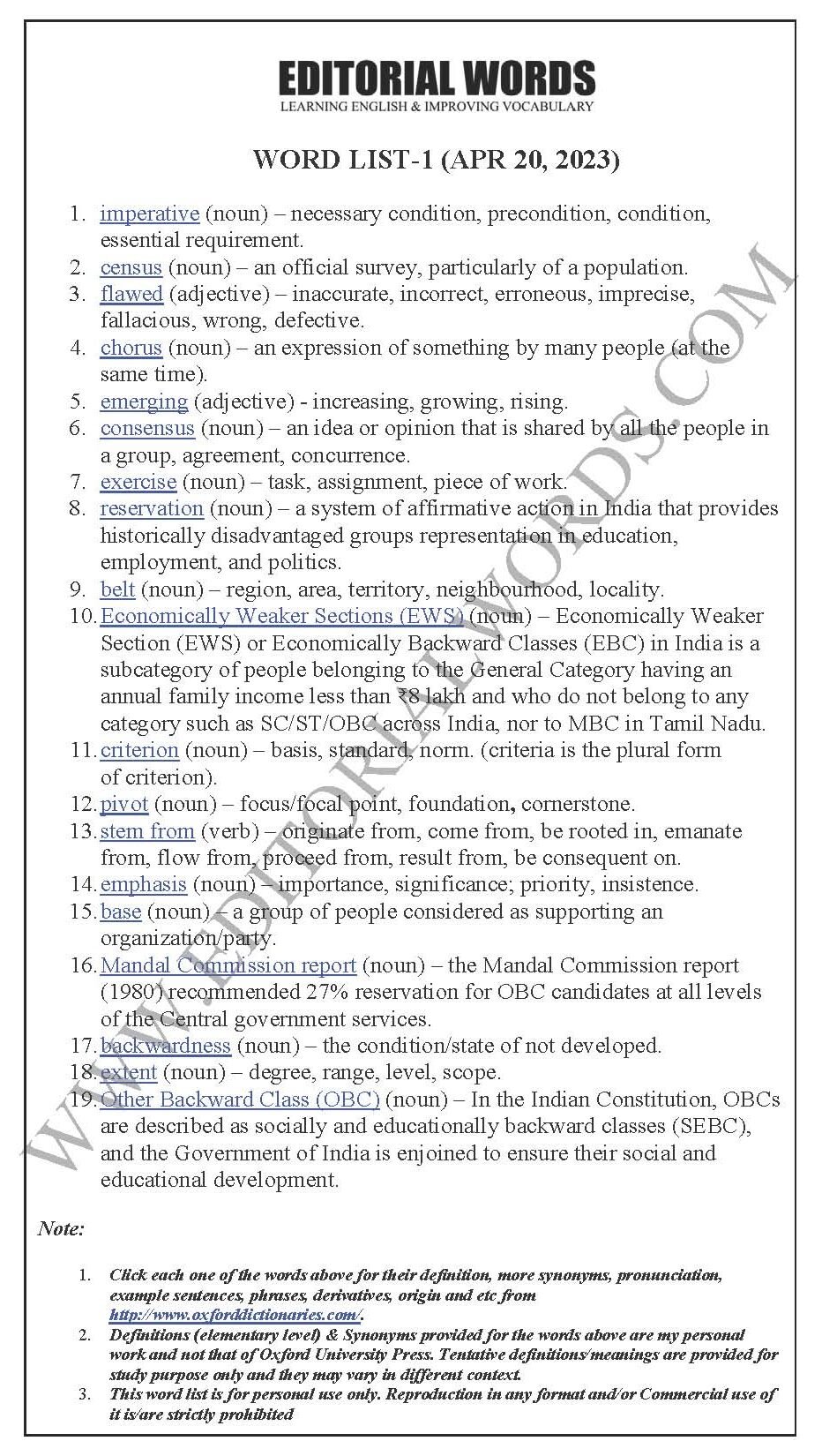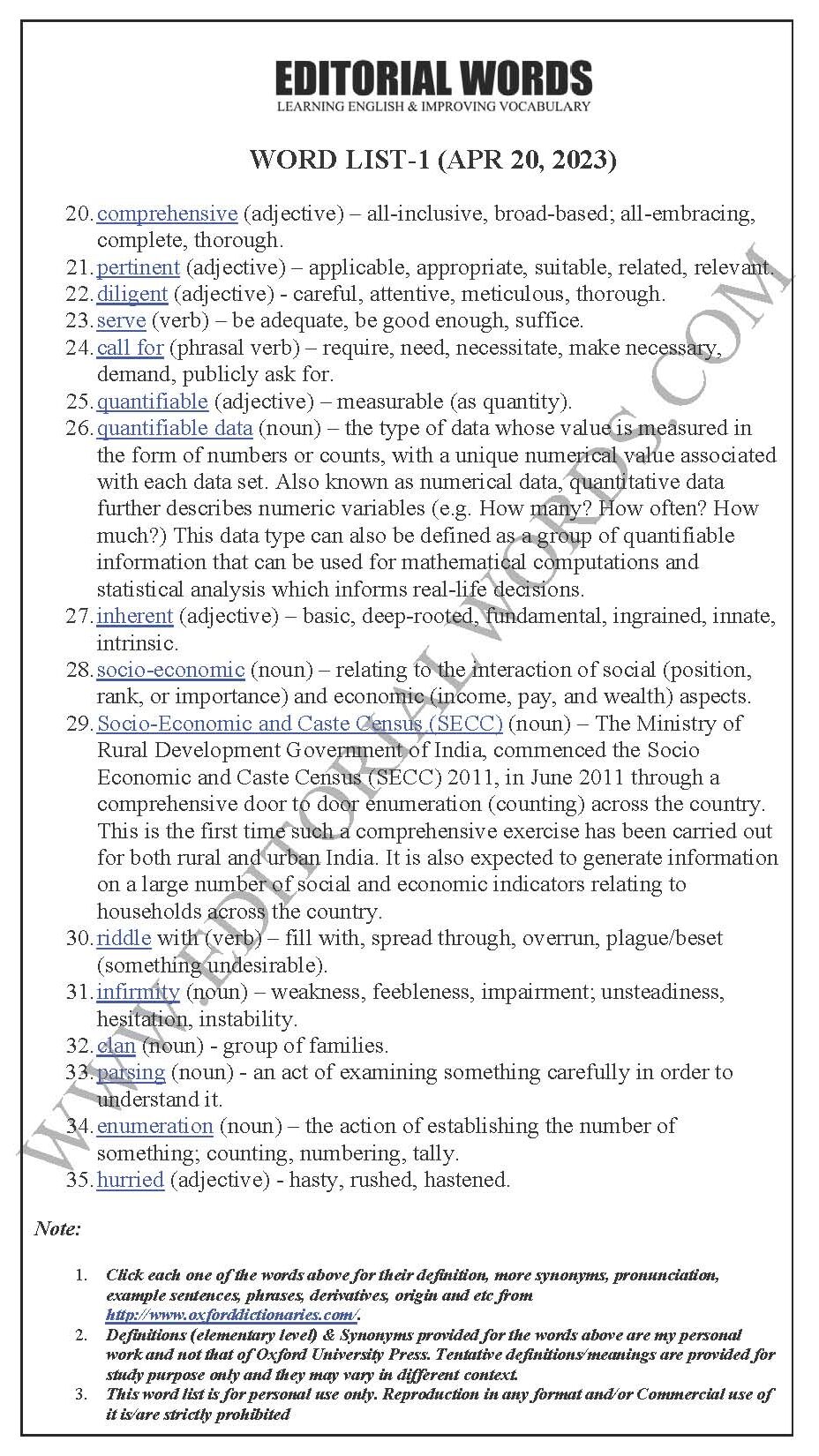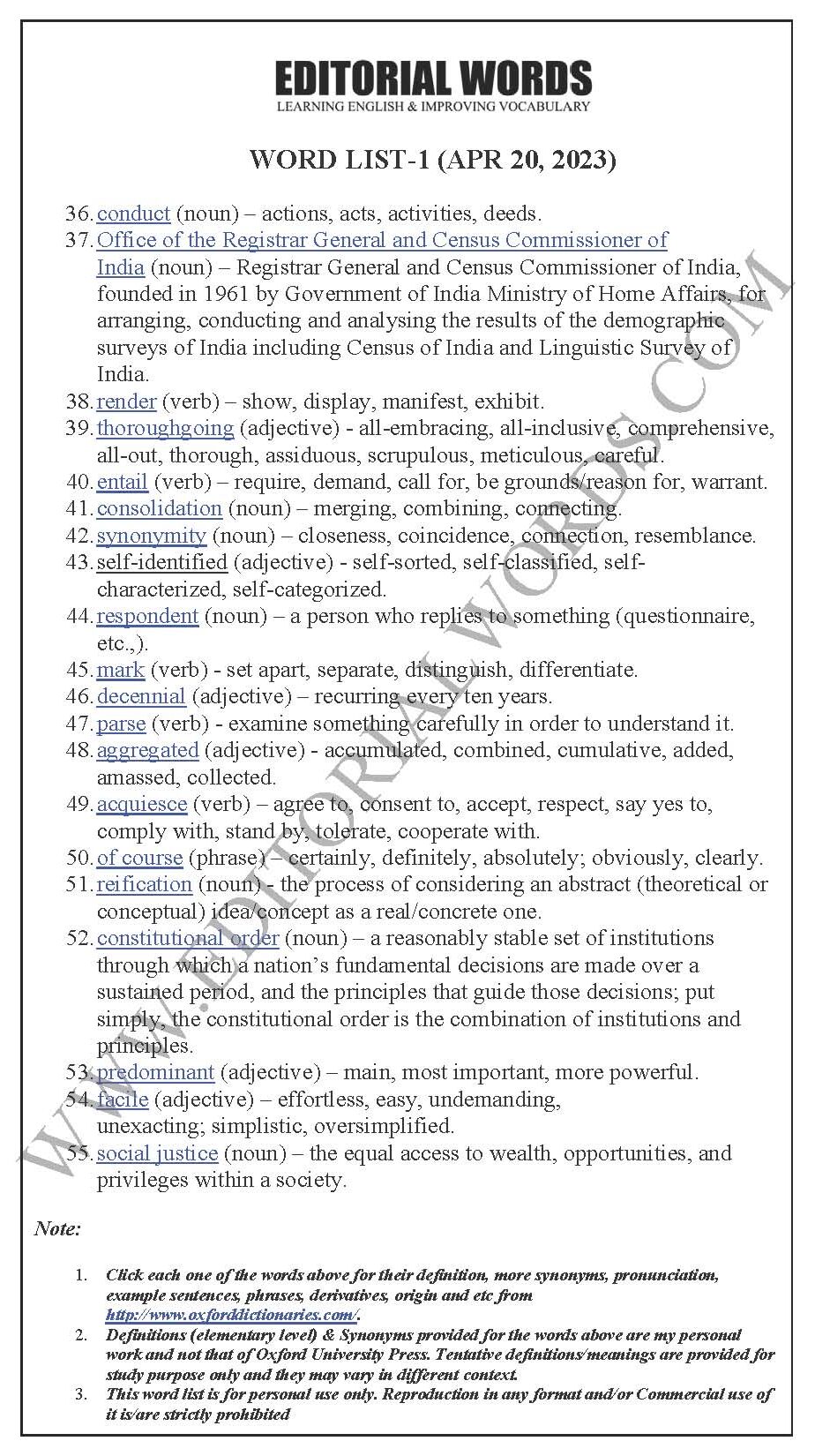The Hindu Editorial (The caste imperative) – Apr 20, 2023
To read this article, click “The Hindu”.
This preview is provided here with permission.
Courtesy: The Hindu
The Hindu Editorial (The caste imperative) – Apr 20, 2023:
- imperative (noun) – necessary condition, precondition, condition, essential requirement.
- census (noun) – an official survey, particularly of a population.
- flawed (adjective) – inaccurate, incorrect, erroneous, imprecise, fallacious, wrong, defective.
- chorus (noun) – an expression of something by many people (at the same time).
- emerging (adjective) – increasing, growing, rising.
- consensus (noun) – an idea or opinion that is shared by all the people in a group, agreement, concurrence.
- exercise (noun) – task, assignment, piece of work.
- reservation (noun) – a system of affirmative action in India that provides historically disadvantaged groups representation in education, employment, and politics.
- belt (noun) – region, area, territory, neighbourhood, locality.
- Economically Weaker Sections (EWS) (noun) – Economically Weaker Section (EWS) or Economically Backward Classes (EBC) in India is a subcategory of people belonging to the General Category having an annual family income less than ₹8 lakh and who do not belong to any category such as SC/ST/OBC across India, nor to MBC in Tamil Nadu.
- criterion (noun) – basis, standard, norm. (criteria is the plural form of criterion).
- pivot (noun) – focus/focal point, foundation, cornerstone.
- stem from (verb) – originate from, come from, be rooted in, emanate from, flow from, proceed from, result from, be consequent on.
- emphasis (noun) – importance, significance; priority, insistence.
- base (noun) – a group of people considered as supporting an organization/party.
- Mandal Commission report (noun) – the Mandal Commission report (1980) recommended 27% reservation for OBC candidates at all levels of the Central government services.
- backwardness (noun) – the condition/state of not developed.
- extent (noun) – degree, range, level, scope.
- Other Backward Class (OBC) (noun) – In the Indian Constitution, OBCs are described as socially and educationally backward classes (SEBC), and the Government of India is enjoined to ensure their social and educational development.
- comprehensive (adjective) – all-inclusive, broad-based; all-embracing, complete, thorough.
- pertinent (adjective) – applicable, appropriate, suitable, related, relevant.
- diligent (adjective) – careful, attentive, meticulous, thorough.
- serve (verb) – be adequate, be good enough, suffice.
- call for (phrasal verb) – require, need, necessitate, make necessary, demand, publicly ask for.
- quantifiable (adjective) – measurable (as quantity).
- quantifiable data (noun) – the type of data whose value is measured in the form of numbers or counts, with a unique numerical value associated with each data set. Also known as numerical data, quantitative data further describes numeric variables (e.g. How many? How often? How much?) This data type can also be defined as a group of quantifiable information that can be used for mathematical computations and statistical analysis which informs real-life decisions.
- inherent (adjective) – basic, deep-rooted, fundamental, ingrained, innate, intrinsic.
- socio-economic (noun) – relating to the interaction of social (position, rank, or importance) and economic (income, pay, and wealth) aspects.
- Socio-Economic and Caste Census (SECC) (noun) – The Ministry of Rural Development Government of India, commenced the Socio Economic and Caste Census (SECC) 2011, in June 2011 through a comprehensive door to door enumeration (counting) across the country. This is the first time such a comprehensive exercise has been carried out for both rural and urban India. It is also expected to generate information on a large number of social and economic indicators relating to households across the country.
- riddle with (verb) – fill with, spread through, overrun, plague/beset (something undesirable).
- infirmity (noun) – weakness, feebleness, impairment; unsteadiness, hesitation, instability.
- clan (noun) – group of families.
- parsing (noun) – an act of examining something carefully in order to understand it.
- enumeration (noun) – the action of establishing the number of something; counting, numbering, tally.
- hurried (adjective) – hasty, rushed, hastened.
- conduct (noun) – actions, acts, activities, deeds.
- Office of the Registrar General and Census Commissioner of India (noun) – Registrar General and Census Commissioner of India, founded in 1961 by Government of India Ministry of Home Affairs, for arranging, conducting and analysing the results of the demographic surveys of India including Census of India and Linguistic Survey of India.
- render (verb) – show, display, manifest, exhibit.
- thoroughgoing (adjective) – all-embracing, all-inclusive, comprehensive, all-out, thorough, assiduous, scrupulous, meticulous, careful.
- entail (verb) – require, demand, call for, be grounds/reason for, warrant, involve.
- consolidation (noun) – merging, combining, connecting.
- synonymity (noun) – closeness, coincidence, connection, resemblance.
- self-identified (adjective) – self-sorted, self-classified, self-characterized, self-categorized.
- respondent (noun) – a person who replies to something (questionnaire, etc.,).
- mark (verb) – set apart, separate, distinguish, differentiate.
- decennial (adjective) – recurring every ten years.
- parse (verb) – examine something carefully in order to understand it.
- aggregated (adjective) – accumulated, combined, cumulative, added, amassed, collected.
- acquiesce (verb) – agree to, consent to, accept, respect, say yes to, comply with, stand by, tolerate, cooperate with.
- of course (phrase) – certainly, definitely, absolutely; obviously, clearly.
- reification (noun) – the process of considering an abstract (theoretical or conceptual) idea/concept as a real/concrete one.
- constitutional order (noun) – a reasonably stable set of institutions through which a nation’s fundamental decisions are made over a sustained period, and the principles that guide those decisions; put simply, the constitutional order is the combination of institutions and principles.
- seek (verb) – try, aim, attempt.
- predominant (adjective) – main, most important, more powerful.
- even if (phrase) – despite the fact that.
- address (verb) – tackle, deal with, attend to, try to sort out.
- facile (adjective) – effortless, easy, undemanding, unexacting; simplistic, oversimplified.
- social justice (noun) – the equal access to wealth, opportunities, and privileges within a society.
Note:
1. Click each one of the words above for their definition, more synonyms, pronunciation, example sentences, phrases, derivatives, origin and etc from http://www.oxforddictionaries.com/.
2. Definitions (elementary level) & Synonyms provided for the words above are my personal work and not that of Oxford University Press. Tentative definitions/meanings are provided for study purpose only and they may vary in a different context.
3. This word list is for personal use only. Reproduction in any format and/or Commercial use of it is/are strictly prohibited.
The Hindu Editorial (The caste imperative) – Apr 20, 2023:



“Phrasal Verbs” We Learnt Last Week
“Idioms & Phrases” We Learnt Last Week
“Important Definitions” We Learnt Last Week
Recent Word Lists For The Hindu Editorial Articles

With the Congress party joining the chorus for an updated caste census, there seems to be an emerging consensus among the political opposition on the need for this exercise. For further reading, visit “The Hindu”. Below is today’s word list-1 for The Hindu Editorial (The caste imperative) – Apr 20, 2023.